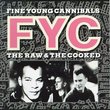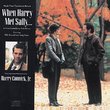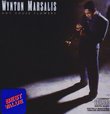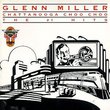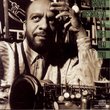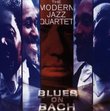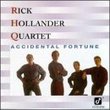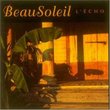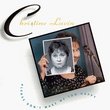| All Artists: Burning Spear Title: Marcus Garvey Members Wishing: 4 Total Copies: 0 Label: Universal Uk/Zoom Release Date: 1/5/2010 Album Type: Import Genre: International Music Style: Reggae Number of Discs: 1 SwapaCD Credits: 1 UPCs: 0042284675727, 016253937741, 042284675727 |
Search - Burning Spear :: Marcus Garvey
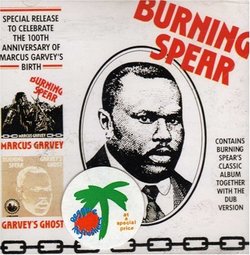 | Burning Spear Marcus Garvey Genre: International Music Out of print in the U.S.! Though it was his third album, Marcus Garvey, originally released in 1975, was a pivotal release for Reggae great Burning Spear (AKA Winston Rodney). Not only did this album introduce Burning Spe... more » |
Larger Image |
CD DetailsSynopsis
Album Description Out of print in the U.S.! Though it was his third album, Marcus Garvey, originally released in 1975, was a pivotal release for Reggae great Burning Spear (AKA Winston Rodney). Not only did this album introduce Burning Spear to a wider audience, it solidified his long-standing position as one of the true original talents in the Reggae field. Universal. Similarly Requested CDs
|
CD ReviewsA world class visionary poet. DJ Rix | NJ USA | 08/26/2000 (5 out of 5 stars) " "And it's like a bell, when you say Burning Spear. And it's like a light, when you say Burning Spear. It's like a cool breeze, when you say Burning Spear. It's like the sunshine, when you say Burning Spear. Yunno, it's a total outstanding atmosphere, when you say Burning Spear." Winston RodneyI purchased Marcus Garvey when it was first released - knowing next to nothing about reggae - on the basis of a rather mysterious magazine review. After I'd played the album just once, I knew that a world class visionary poet was in my home. The songs owed little to the Jamaican pop current at the time. They were dread, slower, trance-like. Spear's politics rose above the violence & intrigue of Island elections, even transcending Rastafarian belief to achieve a universal spirituality. Burning Spear pleaded for the Lion to lay down with the Lamb. Every befouled river is the suffering Jordan. Any gun fired in senseless anger is an affront to the Creator Spirit. Slavery is an ever-present state-of-the-soul. Marcus Garvey is every great liberator. Without peace, no man or woman truly has a home. Only Bob Marley matched Burning Spear's poetry. Over the course of four brilliant albums beginning with this one, the Spear defined the message he brings to audiences to this day.The Marcus Garvey CD collection contains that first, beautiful album plus the dub spin-off, Garvey's Ghost. That combination makes a generous package. You won't exactly get the news from Marcus Garvey, but you could die inside for lack of what it gives you.Bob Rixon" Buy this album right now 3rdeadly3rd | Brisbane, Queensland Australia | 02/22/2003 (4 out of 5 stars) ""Marcus Garvey" is one of the classic albums of the 1970s from Jamaica. In an era which was full of quality releases from such luminaries as Bob Marley, Peter Tosh and Lee Perry, Burning Spear was more than capable of holding their own. As a reggae album, this is an essential purchase.There are a series of misconceptions about Burning Spear and the "Marcus Garvey" album, though. The first is that this is the debut album by the band - it isn't. Spear had released two albums prior to this one, however they hadn't done particularly well. Another misconception is that Burning Spear is a solo act - well, not at the time of this recording. Winston Rodney (one of the vocalists) would eventually go solo under the name Burning Spear, but at this point there were three vocalists. The final major misconception is that this album will sound remotely like Bob Marley's output from a similar time - very untrue.Where Marley's recordings veer towards a more "pop" sensibility, Burning Spear is pure reggae. The music is skeletal and the vocals may not be as pure as the listener might expect, but they are nonetheless outstanding. Winston Rodney himself is often described as simply "chanting", which he does to great effect as his bandmates create a hypnotic sound.The first 10 tracks constitute the original release of "Marcus Garvey". Every single one of these is a gem, from the title track with its opening line "No one remember old Marcus Garvey" right through to Rodney's repeated question "Where will I find my resting place?" at the end of "Resting Place". Particular highlights are the devotional fervour of "Days of Slavery" and the rock-solid groove of "Jordan River".The second 10 tracks are the dub versions of the originals. Here, some history is relevant to understanding the recording. Dub is essentially instrumental reggae with added effects - sound switching between stereo channels, random drop-outs of particular instruments, scraps of vocals appearing at odd moments and so on. By the time "Marcus Garvey" was released, it had become customary in the Jamaican market to release a dub companion to the album in question. What ended up happening with "Marcus Garvey" was that dubs were created - on an album called "Garvey's Ghost" - for an English release. The producers decided that the dark, bass-heavy sound of Jamaican dub was not suitable for English ears and so toned down the overtly Jamaican influences. Every review I have been able to find of the original album of "Garvey's Ghost" describes these dubs as terrible. Appended to "Marcus Garvey", however, they seem quite competently done. They aren't up to the standards of dub legends like Lee Perry, Augustus Pablo or King Tubby, but they are uniformly solid and some ("Black Wadada", for example) actually do provide a new perspective on the song. I am as yet unsure whether these are a new set of dubs, the remasters of the original "Ghost" dubs or simply the dubs as released on "Ghost", but there doesn't appear to be that much to have complained about in the first place.So, for such a strong album, why only 4 stars? The major reason is that fans of Bob Marley will probably find this album very hard to get into - at least to begin with. Spear, in either group or solo mode, is not the most accessible of artists but one who should be attempted at least. The second reason is that not all listeners will want the "Garvey's Ghost" part of the CD - while the second 10 tracks support their originals admirably, it is rather a tough ask for the reggae neophyte to lsiten to both albums." 5 Stars does not do it justice Sean M. Kelly | Portland, Oregon United States | 09/19/2000 (5 out of 5 stars) "Folks, listen and listen good. In the over 100 reviews of reggae and all Jamaican music music that I have done thus far, I have only mentioned 5 albums as absolute no brainer, essential buys ("Screaming Target" by Big Youth, "Catch a Fire" by the Wailers, "Arkology" by Lee "Scratch" Perry, "King Tubby Meets the Rockers Uptown" by Augustus Pablo, and "Equal Rights" by Peter Tosh), and am now adding "Marcus Garvey" by Burning Spear as the 6th no brainer.The militancy of "Marcus Garvey" is unparalleled in all of reggae (even Tosh's solo efforts for all their militancy were done after this lp was done), and the grooves on this lp are second to none. It's a shame that the whole lp isn't available to be sampled, so just listen to "Marcus Garvey" over and over and let it sink in...Add to this 2fer "Garvey's Ghost," a most impressive lp in its own right, and your cup of Burning Spear runneth over 10 fold.I could write for hours on this lp (and have on numerous occasions for album reviews I do for magazines, and will continue to do so if asked), but even then I can not do the glory of this album a quarter of the justice and praise it deserves, nor the glory of Winston Rodney, THE Burning Spear.No music collection, no less a reputable reggae collection can be without the most earth shattering debut in all of reggae music. Get it. Get it now."
|


